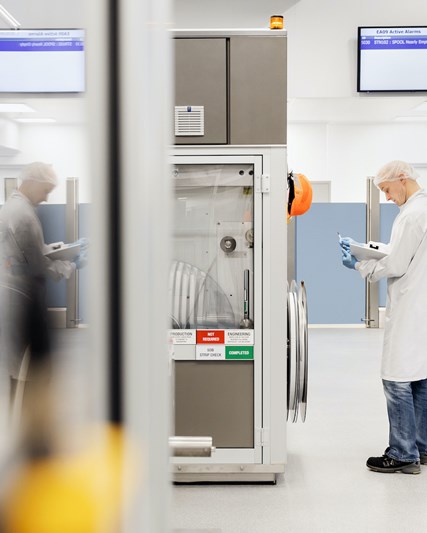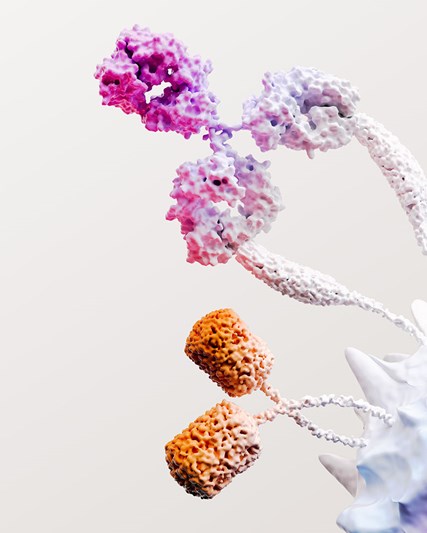EAGLE-2 and EAGLE-3 phase III trials for gepotidacin stopped early for efficacy following pre-planned interim analysis by Independent Data Monitoring Committee
Issued: London UK
For media and investors only
- Gepotidacin could be the first new novel oral antibiotic treatment for uncomplicated urinary tract infections in over 20 years
- GSK plans to submit a New Drug Application for gepotidacin to the US Food and Drug Administration (FDA) in H1 2023
GSK plc (LSE/NYSE: GSK) today announced that the pivotal phase III EAGLE-2 and EAGLE-3 trials evaluating gepotidacin, an investigational treatment for uncomplicated urinary tract infection (uUTI) in female adults and adolescents, will stop enrolment early for efficacy following a recommendation by the Independent Data Monitoring Committee (IDMC). This decision was based on a pre-specified interim analysis of efficacy and safety data in over 3000 patients across the trials.
Chris Corsico, SVP, Development, GSK, said: “Uncomplicated urinary tract infections (uUTI) are the most common outpatient infection with over half of all women developing a uUTI during their lifetime and more than a quarter of women suffering from recurrent uUTIs. There has been no new class of oral antibiotics for uUTI for over 20 years. With the number of uUTIs caused by resistance bacteria increasing, new antibiotic treatments are necessary. The IDMC’s recommendation to stop the EAGLE-2 and 3 trials early for efficacy provides GSK with the opportunity to engage regulatory authorities as we work together to bring a new class of antibiotics to patients with uUTIs.”
The EAGLE-2 and EAGLE-3 trials met the primary efficacy endpoint of combined clinical and microbiological resolution following treatment at the Test-Of-Cure (TOC) visit for gepotidacin versus nitrofurantoin in patients with a confirmed uUTI and a uropathogen sensitive to nitrofurantoin. The IDMC review did not identify any safety concerns.
The EAGLE-2 and 3 trials are now closed for recruitment, with final study visits and data collection anticipated during the first quarter of 2023. GSK will work with regulatory authorities to commence regulatory filings for gepotidacin in H1 2023. The full results will also be submitted for presentation at a scientific congress and for publication in a peer-reviewed journal in 2023.
The development of gepotidacin is the result of a public-private partnership between GSK, the US government’s Biomedical Advanced Research and Development Authority (BARDA), part of the Administration for Strategic Preparedness and Response at the U.S. Department of Health and Human Services, and Defense Threat Reduction Agency (DTRA) within the Department of Defense. The collaboration with BARDA was established in 2013 with the aim to support the development of antibiotics to fight antibiotic resistance and bioterrorism under contract number HHSO100201300011C.
uUTIs are one of the most common infections in the community.[1] The annual incidence of uUTI (or acute cystitis) in women is 12% and c.˜20% in women over 65; 30-44% of uUTI episodes are recurrent[1],[2],[3]. Escherichia coli (e. coli) bacteria are the main cause of uUTI1 but it is showing increasing resistance to antibiotics currently used[4],[5] leaving healthcare professionals with fewer oral options to treat their patients.[6] As a result, there is a need to develop new oral antibiotics that may help treat uUTIs and potentially combat antimicrobial resistance (AMR) in the community[1], particularly given that there has not been a new class of oral antibiotics for uUTI for over 20 years.[2],[7]
About the EAGLE (Efficacy of Antibacterial Gepotidacin Evaluated) phase III programme
The phase III clinical programme for gepotidacin in adults and adolescents comprises three trials:
- EAGLE-2 (non-inferiority uUTI trial, 204989) compares the efficacy and safety of gepotidacin (1500mg administered orally twice daily for 5 days) to nitrofurantoin (100mg administered orally twice daily for five days). The trial duration for participants is approximately 28 days. The primary endpoint is the combined clinical and microbiological response at the TOC visit in patients with qualifying uropathogens.
- EAGLE-3 (non-inferiority uUTI trial, 212390) compares the efficacy and safety of gepotidacin (1500mg administered orally twice daily for 5 days) to nitrofurantoin (100mg administered orally twice daily for 5 days). The trial duration for participants is approximately 28 days up until follow-up. The primary endpoint is the combined clinical and microbiological response at the TOC visit in patients with qualifying uropathogens.
- EAGLE-1 (non-inferiority urogenital gonorrhoea trial, BTZ116577) compares the efficacy and safety of gepotidacin (3000mg administered orally at the trial site during the baseline visit followed by self-administration of a second oral 3000mg dose as an outpatient 10 to 12 hours after the first dose) to a single intramuscular 500mg dose of ceftriaxone plus a single oral 1g dose of azithromycin in approximately 600 patients with uncomplicated GC caused by the bacterium NG. The trial duration is approximately 21 days. At the TOC visit, the primary endpoint is the culture-confirmed bacterial eradication of NG from the urogenital body site. The EAGLE-1 trial is investigating gepotidacin for the treatment of uncomplicated urogenital gonorrhoea and is ongoing.
- EAGLE-2 and 3 are similar trials and together provide substantial clinical evidence, with EAGLE-2 providing additional pharmacokinetic data and EAGLE-3 including an on-treatment ECG test. Trial enrolment overlapped with the COVID-19 pandemic (the EAGLE-2 trial started in October 2019, and the EAGLE-3 trial began in May 2020), and trial sites are located across 12 countries, each with different infection and resistance patterns.
About gepotidacin
Gepotidacin is a novel, investigational bactericidal, first-in-class triazaacenaphthylene antibiotic that inhibits bacterial DNA replication by a distinct mechanism of action[8],[9] and equally and independently binds to two different Type II topoisomerase enzymes.[10] This provides activity against most strains of E. coli and S. saprophyticus, including isolates resistant to current antibiotics[11],[12] Due to the equal and independent binding at both enzymes, mutations in both enzymes are needed to significantly affect gepotidacin susceptibility.
GSK in antibiotics
GSK has been developing and supplying antibiotics for more than 70 years. Research and development continue to investigate new tools to prevent and mitigate infectious disease – and get ahead of antimicrobial resistance. GSK is already a leader on the Antimicrobial Resistance Benchmark of the Access to Medicine Foundation. In September 2022, GSK entered into an exclusive licence agreement with Spero Therapeutics to add a late-stage antibiotic, tebipenem HBr for the potential treatment of complicated urinary tract infections (cUTI), to our pipeline. The closing of the transaction is subject to the expiration of the waiting period under the Hart-Scott-Rodino Antitrust Improvements Act of 1976, as amended.
About GSK
GSK is a global biopharma company with a purpose to unite science, technology, and talent to get ahead of disease together. Find out more at gsk.com/company
Cautionary statement regarding forward-looking statements
GSK cautions investors that any forward-looking statements or projections made by GSK, including those made in this announcement, are subject to risks and uncertainties that may cause actual results to differ materially from those projected. Such factors include, but are not limited to, those described in the Company's Annual Report on Form 20-F for 2021, GSK’s Q3 Results for 2022 and any impacts of the COVID-19 pandemic.
References
[1] Hooton TM. Uncomplicated Urinary Tract Infection. N Engl J Med. 2012;366:1028-37.
[2] Rich SN, Klann EM, Almond CR, Larkin EM, Nicolette G, Ball JD. Associations between antibiotic prescriptions and recurrent urinary tract infections in female college students. Epidemiology and Infection. 2019;147.
[3] Medina M, Castillo-Pino E. An introduction to the epidemiology and burden of urinary tract infections. Therapeutic Advances in Urology. 2019;11:175628721983217.
[4] WHO. Global priority list of antibiotic-resistant bacteria to guide research, discovery, and development of new antibiotics. 2017.
[5] CDC. Antibiotic resistance threats in the United States. 2019. Available from: https://www.cdc.gov/drugresistance/pdf/threats-report/2019-ar-threats-report-508.pdf [Accessed October 2022]
[6] Kaye KS, et al. Clin Infect Dis. 2021;73(11):1992-1999
[7] 2020 Antibacterial agents in clinical and preclinical development: an overview and analysis. Geneva: World Health Organization; 2021. Licence: CC BY-NC-SA 3.0 IGO.
[8]Gibson EG, et al. ACS Infect Dis 2019;5(4):570−581
[9] Bax BD, et al. Nature 2010;466(7309):935–940.
[10] Oviatt A, et al. Poster #L0178 presented at ECCMID, 23–26 Apr, 2022, Lisbon, Portugal.
[11] Biedenbach DJ, et al. Antimicrob Agents Chemother 2016;60(3):1918–1923
[12] Mushtaq S, et al. Poster #P1849 presented at ECCMID, 13–16 April, 2019, Amsterdam, The Netherlands.



